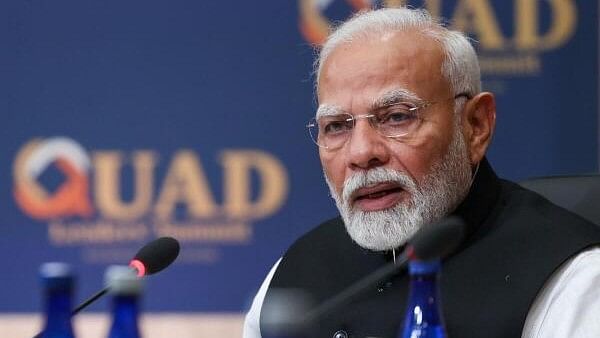
Prime Minister Narendra Modi in Delaware, USA.
Credit: PTI Photo
New Delhi: India has committed $7.5 million (Rs 62 crore) to provide vaccines to prevent Human Papillomavirus infection as well as sampling and testing kits for the detection of cervical cancer in the Indo-Pacific. It has joined Australia, Japan, and the United States to launch a programme to help countries in the region combat the disease.
New Delhi also offered its cost-effective and efficient visual inspection with Acetic Acid method for cervical cancer screening as a model for the Indo-Pacific region. The simple method allows healthcare workers to detect early signs of cervical cancer without the need for advanced laboratory infrastructure. The Serum Institute of India, in partnership with Gavi, the Vaccine Alliance, and the Quad, has committed to support orders of up to 40 million HPV vaccine doses for the Indo-Pacific region.
As he hosted Prime Minister Narendra Modi, Japan's Prime Minister Fumio Kishida and Prime Minister Anthony Albanese of Australia at his hometown in Delaware for the fourth in-person summit of the Quad, American President Joe Biden took ‘Cancer Moonshot’ – an initiative close to his and his wife Jill Biden’s heart – beyond the US to help the Indo-Pacific nations fight against cervical cancer.
“I'm proud to announce the Quad Cancer Moonshot to end cancer around the world, starting with cervical cancer. Cervical cancer is one of the most preventable cancers, yet every year 150,000 women in the Indo-Pacific die from it. We cannot and will not let that continue,” Biden posted on X after the launch of the Quad Cancer Moonshot programme.
The US Department of Defence, through the US Navy, will support HPV vaccine expert exchanges with Indo-Pacific partners from next year. This partnership will enable healthcare professionals from partner nations to receive hands-on training, build capacity, and strengthen healthcare systems across the Indo-Pacific, focusing on preventive health services like HPV vaccination. The initiative aims to bolster regional cooperation on cancer and promote health security in the region.
“A very cost-effective ongoing cervical cancer screening program on a mass scale is running in India. Besides, India also runs the world's largest health insurance scheme,” Modi said as he joined Biden and other leaders of Quad in Delaware in the US.
“Special centres have also been created to make medicines available to everyone at an affordable cost. India has also developed its own vaccine for cervical cancer. And new treatment protocols are being launched with the assistance of Artificial Intelligence,” he said, adding: “India is ready to share its experience and expertise (with the Indo-Pacific nations).”
Modi announced that India would provide support for radiotherapy treatment and capacity building for cancer prevention in the Indo-Pacific region.
Biden, the then vice president of the US, had launched the Cancer Moonshot in 2016 after one of his sons died of the disease. The programme was aimed at accelerating scientific discovery in cancer research, fostering greater collaboration, and improving the sharing of cancer data. A year after taking over as the US president in 2022, he and his wife added fresh momentum to the programme, setting the target to bring down deaths due to cancer by 50 per cent over the next quarter of a century.
The US Agency for International Development (USAID) will look to provide critical financial and technical support to expand HPV vaccination access. The US government, through USAID, has made a pledge of at least $1.58 billion to Gavi, the Vaccine Alliance, which will bolster global efforts to increase vaccine coverage, including HPV vaccines, in low-income and middle-income countries, helping to protect millions of women and girls from cervical cancer across the Indo-Pacific and beyond.
